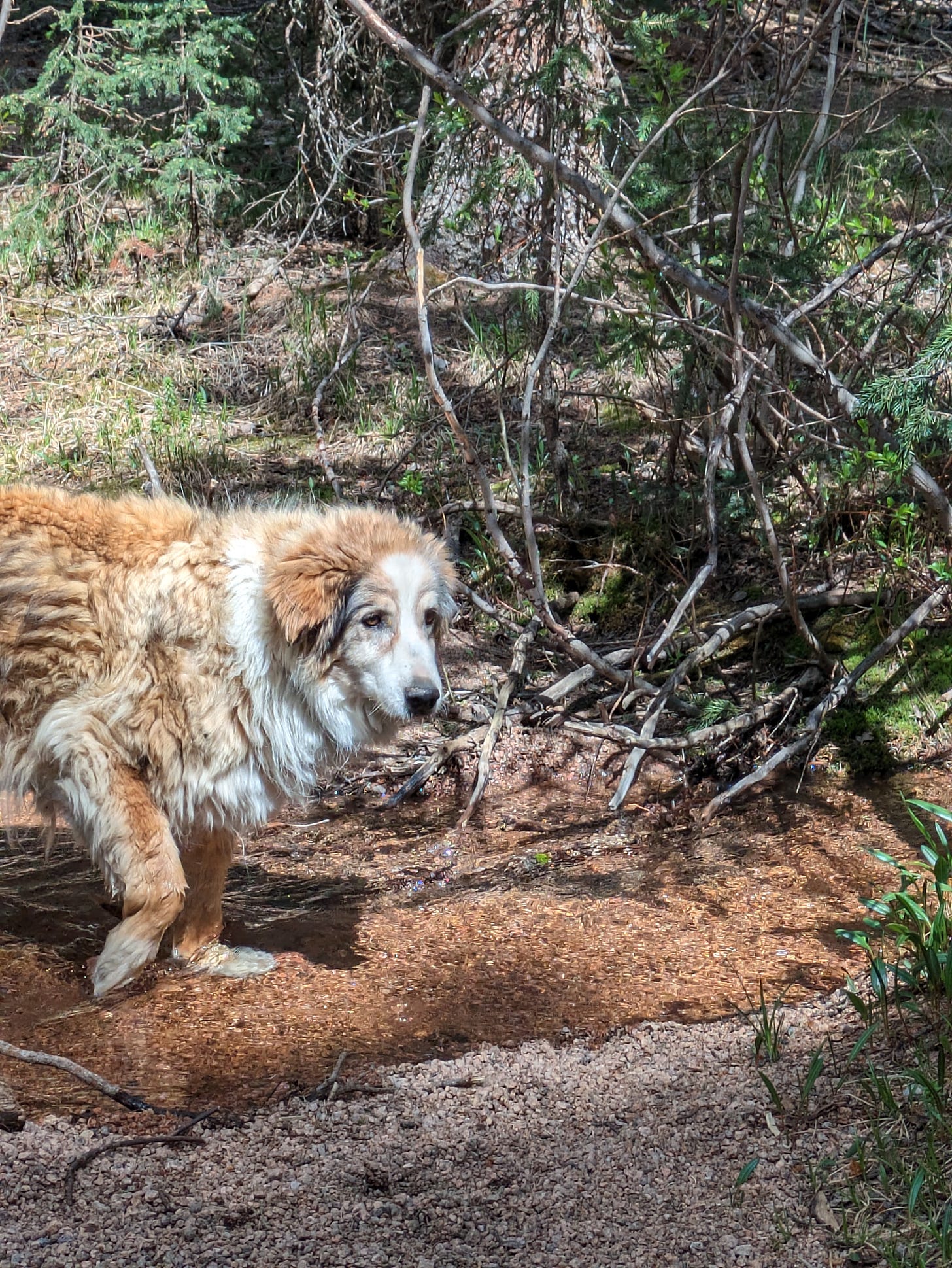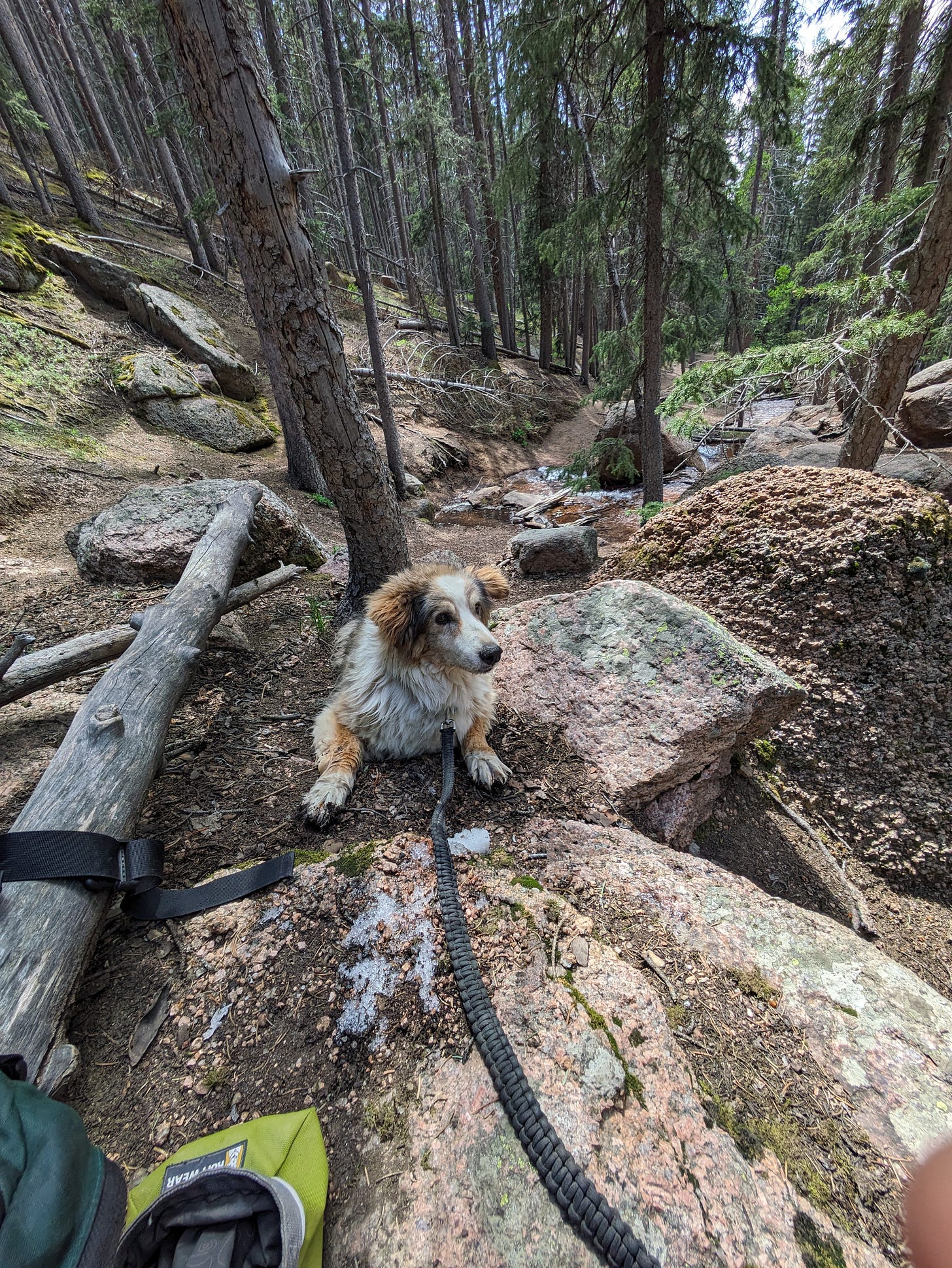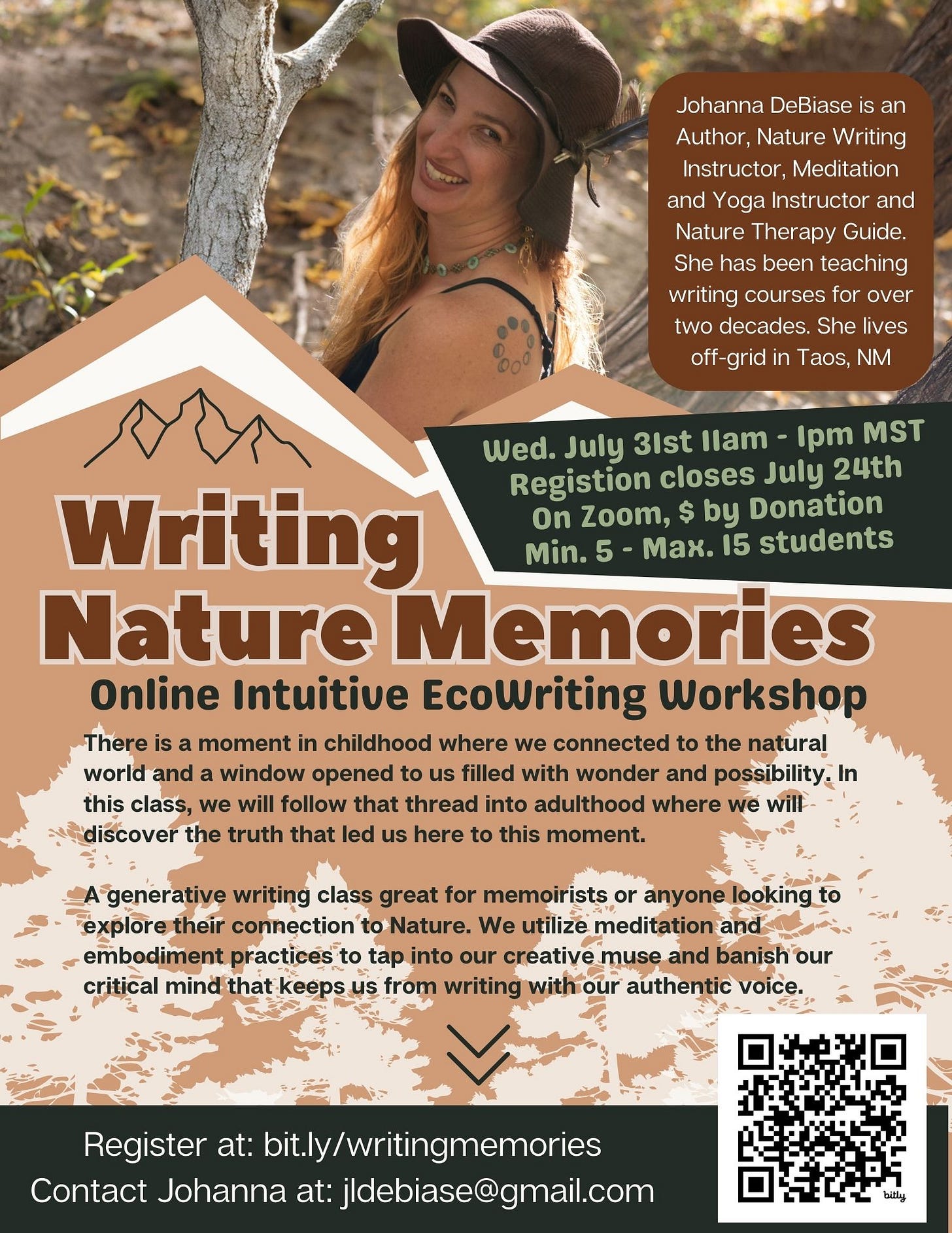The Gift of Aging
How do you feel about being elderly? What do you think of your elders? Are you happy to be aging or would you rather avoid it?
In the Colorado Mountains, I am climbing to the waterfall with my elder collie in tow. She moves slow these days, even with her arthritis medication for the pain. Huffing and panting up the mountainside, always a step behind. I remember a time when she ran ahead, eager to be in the lead. Now she is content to just keep up. We picked a short hike and stopped short of scrambling up the rumbling falls for her sake, but I wonder how much of this slow pace is for me to appreciate as well. Halfway up my knee tightens, and I stop to stretch it. I can feel the 10,000 feet of altitude, which is 3,000 feet of thinner air than I’m used to, pressing against my lungs. My dog’s heavy breath is my heavy breath. Her short stride is my short stride. But she is showing off. At the vet, a chart equated her to a 95-year-old human, and I can only hope to be able to hike this trail at her age.
Perhaps in 2070, I might drink from these creeks with my futuristic water bottle filtration system, breathe deep with my compact oxygen mask, and maintain a perfect body temperature with my biotech skins that replicate canine fur cooling systems. Or more likely, I’ll skip naked and barefoot up these falls with twigs in my hair, my wrinkly ass out for the hordes that will inevitably overpopulate the Rocky Mountains to see. I think about aging a lot. I think about what a blessing it is.
In American society, aging is frowned upon. From Botox to senior centers, the aging population is reminded daily that they are unwelcome. We do not want to look like them, and we really prefer not to look at them at all. In the media, portrayals of seniors are largely negative; they are often depicted as feeble, senile, financially distressed, and not contributing to society. The pandemic revealed many problems with nursing home regulations where seniors are not given the right amount of care and have little ability to make changes to improve their situation. And pray you are not elderly and without financial or family resources in the United States, you could become a ward of the state with complete loss of independence. Unlike in other cultures like Native American or Middle Eastern where elders are typically revered, there is a sense in American society that to be old is to be powerless, ugly and unwanted. Of course, Americans are at the forefront of anti-aging biohacking.
On the full moons, I go to a women’s circle in my neighborhood. Though there are women of all ages there, it is orchestrated by the elders in the community. These are the tough women who pioneered this off-grid community with grit and perseverance. Some are newer, arriving after raising kids, retiring from a career and deciding that living the rest of their days painting out of a solar-powered school bus sounded great to them. They are musicians, poets, healers, adobe builders, artists, herbalists, farmers, and more. They probably had careers long ago that I don’t even know about as teachers or counselors or government workers. Some of them may be grandmas, but not like you’d think of a grandma; they do not sit around wearing bonnets, knitting and watching daytime television. Instead, they are drumming up the sunrise, praying on mountain tops, hauling water from the springs, building, putting on shows, sleeping under the stars. The oldest one amongst us is 92 years old and she lives the most remotely, down the roughest road, alone with her two dogs. She walks with a cane that rattles with seeds and bones. All of them laugh with lightning—sharp, wise and prophetic.
In circle, they might complain about slowing down in mind and body and the challenges of aging; they are human after all. But I also hear them reframe these old stories, like last night when a friend said of forgetting, “I remember what I need to remember.” About moving slower, one woman said, “I love being conscious of each movement, more aware of my body than ever.” Nothing is taken for granted. One woman spoke of another who was no longer able to come to circle. She is in an assisted living home now. She cannot see any longer. She still writes poetry in big elaborate swirls across large pieces of paper for others to interpret. These are the long paths we are treading from the day we are born. Each of us is lucky if we get to live so long.
The ancient cedar growing out of the side of the old eastern mountains continues to rise and prosper. In a forest, the oldest trees are the ones that provide nourishment for the young ones that live in their shadow, passing nutrients, water, and carbon to seedlings through mycorrhizal networks. Some scientific experiments have shown that seedlings that connect to the network of an old tree can have their survival rate increased by 25–400%.
What can we learn from our elders about survival? What long perspectives can we learn from them to help us move forward generously and sustainably? How would we like to be treated when we are elders and how can we treat our elders like that now? To age gracefully is to reject the over-culture’s perception of what aging looks like. It is more than just letting your hair go white, but a complete paradigm shift. As we trade in speed for wisdom, how can we honor this precious blessing of elderhood? How can we embrace being an old fogey with humor and endless curiosity instead of trepidation?
The life of a dog is much shorter than ours; that is always the sad truth. My dog rests in the shade of a lodgepole pine beside the churning falls, holding her lids up from the inevitable nap that will follow her efforts. Though she can no longer hear, her nose is alert to scents, her eyes search the forest bright-eyed with wonderment. It’s time to go, but she is struggling to get back up. From this reclining angle, she is unable to lift her back legs and I assist her carefully. If I touch her the wrong way, she will snap at me to let me know. A once gentle dog, she’s no longer afraid to bare her teeth if you piss her off. I respect this thoroughly. On the way down the mountain, she trips over her own feet, rolls on her back side, and gathers herself back up to rise. She is not embarrassed; she does not lose heart. She continues her tromping. There is only this. Only this moment. Alive in the forest with family and bubbling freshwater streams.
Death is a shadow of a finger, curling around our shoulder, beckoning us to sleep. We can choose to ignore it or welcome it in, let it rest beside us, a gift of presence in a busy world that is always seeking to mire us in minutiae, so we forget what’s truly important. To age bravely, we must step closer to death. Every wrinkle is a path well-trodden. Every ache is a reminder of our precious survival. Every lost memory is one less thing to cling to. Aging is a blessing to be proud of. We made it this far, or as we chanted last night in our moon circle through raucous laughter, “we’re still here.”





Thank you for this lovely acknowledgment of ageing and elders. So much I am treasuring in this process, wonderful to share and celebrate all this accumulated wisdom and humour
Love the line - “They all laugh with lightning - sharp, prophetic and wise.” And I wish I was part of your full moon circle.